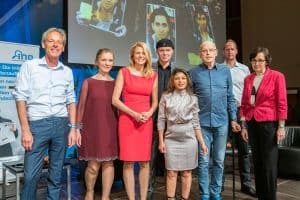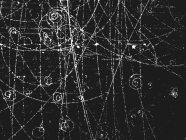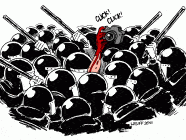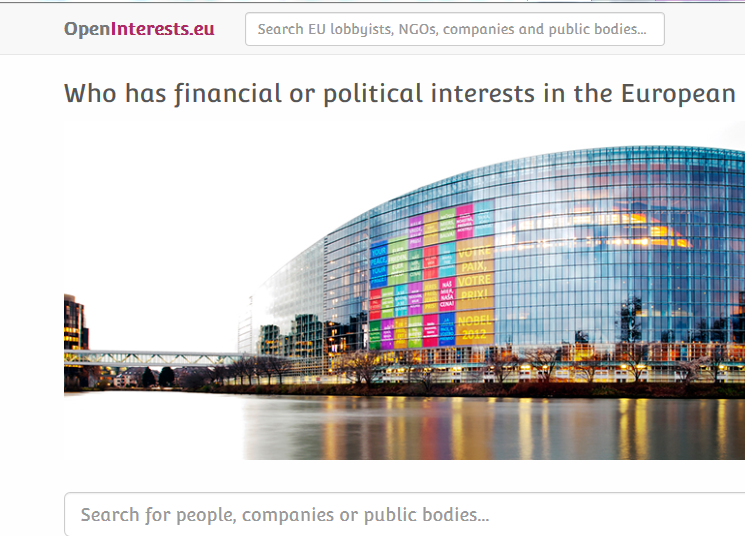The European Journalism Observatory has been awarded the 2019 Günter Wallraff Prize.

The EJO won the prize jointly with imprisoned Saudi blogger Raif Badawi, whose wife Ensaf Haidar (4th from R) represented him at the award ceremony. The EJO was represented by its director Susanne Fengler (3rd from L). Günter Wallraff himself (3rd from R) was also present.
On 14 June, the European Journalism Observatory (EJO) received the 2019 Günter Wallraff Prize for the critical examination of journalism. The prize was awarded by the German media watchdog Initiative Nachrichtenaufklärung (INA) and the award ceremony took place during the 5th Kölner Forum für Journalismuskritik, organised by the INA together with the national public service radio Deutschlandfunk. The prize is named after and was co-initiated by Günter Wallraff, Germany’s most well known investigative journalist.
In the words of the INA jury, the EJO functions as “an interface between research into the media, communication and journalism, and media practice”. The prize citation adds: “Especially at a time when European unity is faltering, the work of the EJO is of great importance for independent, high-quality journalism. As a beacon of constructive critiquing of journalism, the EJO offers an outstanding example of European and transatlantic news education.”
“A bold project”
The prize laudation was delivered by Deutschlandfunk editor-in-chief Birgit Wentzien, who hailed the EJO as “a bold project that creates a European public sphere in the field of media”. Wentzien added that the EJO encourages European newsrooms to deal with their shortcomings in a self-critical and transparent fashion.
The EJO was founded in 2004 by Stephan Russ-Mohl, who was until 2018 Professor of Journalism and Media Management at the Università della Svizzera italiana (USI) in Lugano. It was launched as a non-profit centre based at the USI and has over the years evolved into a decentralised network of 13 European media and journalism research institutes. The EJO aims to bridge the gap between journalism research and media practice and to provide an independent critical examination of the European media. This is particularly important in EJO partner countries such as Poland and Hungary, where the media has in recent years come under increased political pressure.
The prize is also a great accolade for those EJO partners – especially in southern, central and eastern Europe – who work tirelessly in the interests of quality journalism and independent and transparent media under what are often very difficult conditions. In southern and eastern Europe, the EJO is often pretty much the only platform that provides media practitioners with information on the media industry and encourages them to reflect on journalism, as in this area there is a dearth of relevant trade journals or online platforms. This means that media practitioners do not have easy access to the information they need to help them reflect on their work and to improve professional standards.
Controversial topics
The prize money will be used by the EJO team for new joint research projects. Previous joint projects include in-depth studies looking at how controversial topics such as the refugee crisis, the inauguration of Donald Trump, the Ukraine conflict and Brexit were covered by the European media.
The Saudi blogger and human rights activist Raif Badawi, who is currently serving a ten-year prison sentence in Saudi Arabia and was in addition sentenced to 1,000 lashes and a heavy fine, was awarded the Günter Wallraff Prize jointly with the EJO. Badawi’s wife Ensaf Haider, who campaigns internationally for the release of her husband, accepted the award on his behalf. In an impassioned second laudation, Günter Wallraff stressed how important it is that the international community continues to apply pressure on the Saudi government.
The prize money of 10,000 Euros was provided by the media group Mediengruppe RTL, the Cologne-based retail consortium Rewe Group, the football club FC Cologne and Günter Wallraff himself. It was shared equally between the two award-winners.
Image: Photo by David Ertl (Deutschlandfunk)
If you liked this, you may also be interested in The pressing need for a European public sphere.
Sign up for the EJO’s regular monthly newsletter or follow us on Facebook and Twitter.
Tags: Central Europe, Deutschlandfunk, Eastern Europe, Ensaf Haidar, Günter Wallraff Prize, Initiative Nachrichtenaufklärung (INA), Journalism research, journalism standards, Media Education, Raif Badawi, southern Europe, Stephan Russ-Mohl













































